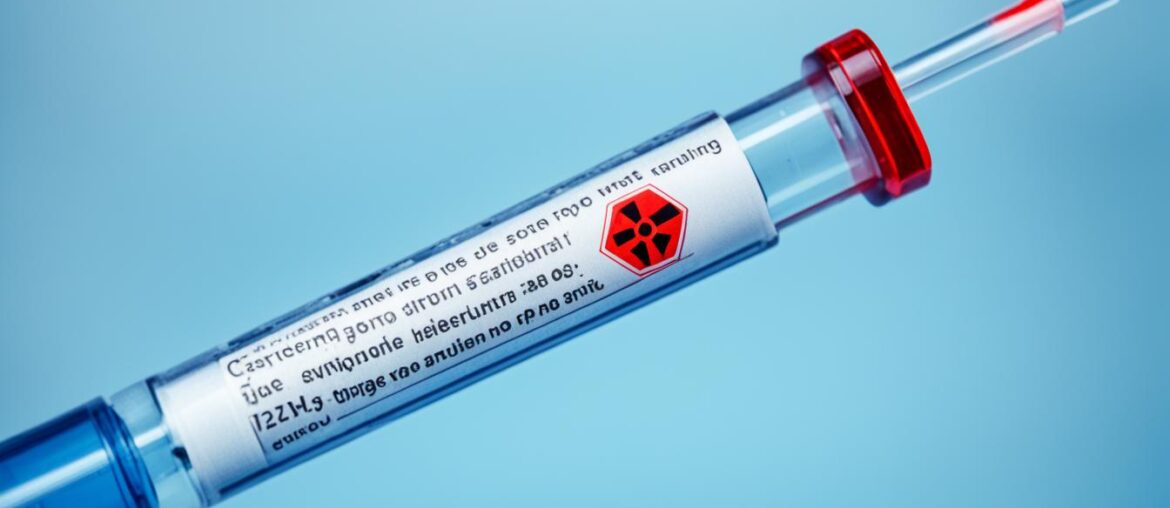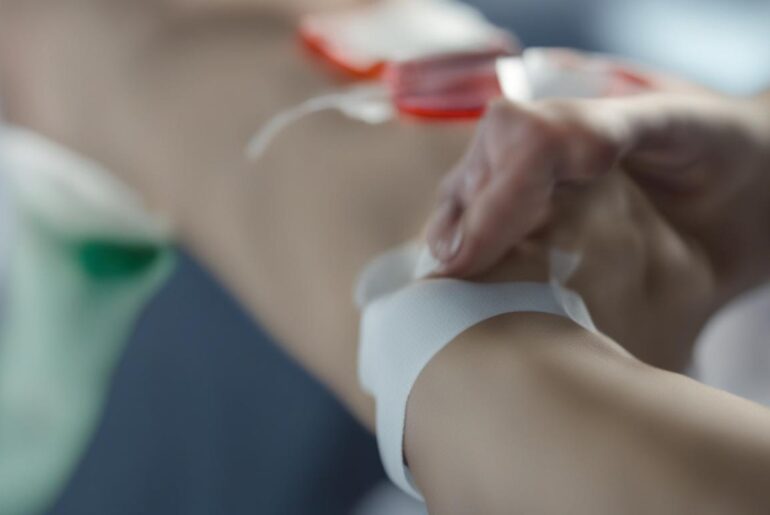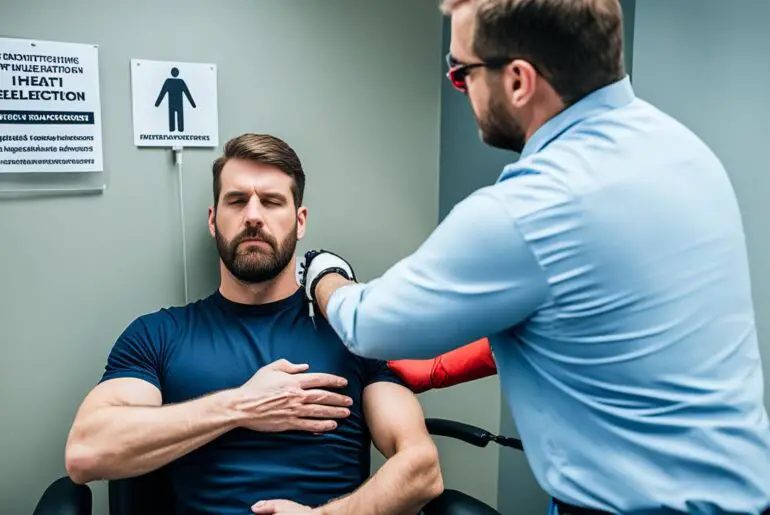Did you know that the FDA has issued a warning about a popular weight-loss trend? It turns out that HCG diet injections, which are marketed as a way to shed pounds quickly, may not be as safe as they seem. Despite their popularity, these injections have not been approved by the FDA for weight loss purposes, and there is no substantial evidence to support their effectiveness.
Key Takeaways:
- The FDA advises against using HCG diet injections for weight loss due to their potentially dangerous practices and very low-calorie diets.
- There is no substantial evidence to support the claim that HCG increases weight loss beyond caloric restriction.
- Very low-calorie diets can lead to side effects such as gallstone formation, electrolyte imbalances, and irregular heartbeat.
- HCG weight-loss products marketed with a severely restrictive diet are considered illegal and in violation of FDA regulations.
- If you experience any adverse events or side effects from using HCG diet injections, report them to the FDA’s MedWatch program.
Risks Associated with HCG Diet Injections
When considering the use of HCG diet injections, it is essential to be aware of the potential risks and side effects that may arise, especially when following a very low-calorie diet. These risks include:
- Fatigue: Some individuals may experience fatigue and a lack of energy while on the HCG diet injections. This can make it challenging to perform daily activities and maintain productivity levels.
- Irritability and Restlessness: The severe calorie restriction associated with HCG diet injections may lead to feelings of irritability and restlessness, making it difficult to maintain a positive mood and overall well-being.
- Depression: The combination of a restrictive diet and hormonal changes from HCG injections can contribute to feelings of depression and a decline in mental health.
- Fluid Buildup: In some cases, HCG diet injections can cause fluid retention, leading to bloating and discomfort.
- Swelling of the Breasts in Males: Men who use HCG diet injections may experience an enlargement of breast tissue due to hormone imbalances.
- Blood Clot Formation: There is a concern that HCG diet injections, when combined with a very low-calorie diet, may increase the risk of blood clot formation, which can potentially lead to serious complications.
- Gallstone Formation: The severe calorie restriction associated with the HCG diet can increase the likelihood of gallstone formation, causing abdominal pain and discomfort.
- Electrolyte Imbalances: The imbalanced nutrient intake from a very low-calorie diet can disrupt the body’s electrolyte levels, leading to various health issues.
- Irregular Heartbeat: The combination of nutrient deficiencies and hormonal changes can result in an irregular heartbeat, posing a risk to cardiovascular health.
Before embarking on the HCG diet injections, it is crucial to carefully consider these potential risks and side effects. Consulting with a healthcare professional is highly advised to assess whether the benefits outweigh the safety concerns associated with HCG diet injections.
FDA Regulations on HCG Diet Injections
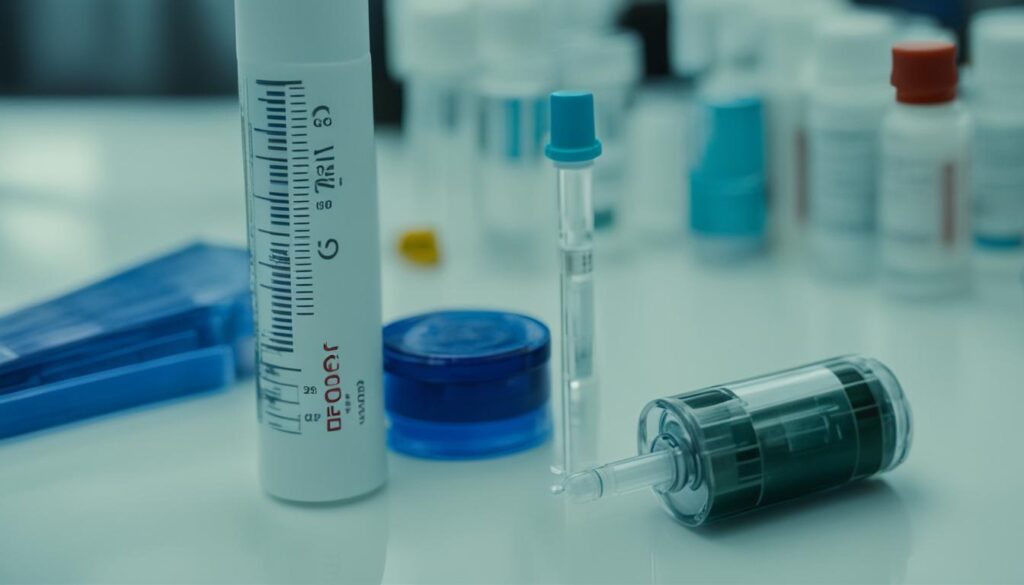
When it comes to HCG diet injections, it is important to understand the regulations set forth by the FDA. The FDA has not approved HCG diet injections for weight loss, categorizing them as unapproved drugs for this purpose. In fact, the FDA has specifically stated that HCG weight-loss products are not only unapproved, but they are also illegal and in violation of the Federal Food, Drug, and Cosmetic Act.
The FDA, along with the Federal Trade Commission (FTC), has taken action against companies marketing over-the-counter HCG products labeled as homeopathic for weight loss. These products have not been evaluated by the FDA for safety or effectiveness. Warning letters have been issued to these companies to stop the illegal promotion and sale of these products.
FDA Regulations on HCG Diet Injections
| Regulation | Status |
|---|---|
| HCG Diet Injections for Weight Loss | Not approved |
| HCG Weight-Loss Products | Illegal and in violation of the Federal Food, Drug, and Cosmetic Act |
| Over-the-Counter HCG Products Labeled as Homeopathic | Not evaluated by the FDA for safety or effectiveness |
It is essential to adhere to FDA guidelines and regulations to ensure the safety of consumers. The FDA’s oversight and enforcement actions are in place to protect individuals from potentially harmful and unproven weight-loss practices.
Effectiveness of HCG Diet Injections
While some people may experience weight loss while using HCG diet injections, it is likely due to the extreme calorie restriction rather than the HCG hormone itself. The FDA has stated that there is no substantial evidence to support the claim that HCG increases weight loss beyond caloric restriction. Therefore, the effectiveness of HCG diet injections for weight loss is questionable. It is important to discuss safe and effective weight loss options with a healthcare professional.
When it comes to weight loss, it’s crucial to prioritize health and safety. While the idea of achieving quick results with HCG diet injections may be appealing, the scientific evidence simply does not support their effectiveness. Instead of relying on potentially risky methods like HCG injections, it is advisable to explore other weight loss strategies that are backed by research and approved by medical professionals.
“The effectiveness of HCG diet injections for weight loss is questionable. It is important to discuss safe and effective weight loss options with a healthcare professional.”
Instead of solely focusing on rapid weight loss, a more sustainable approach would involve adopting a well-balanced diet and engaging in regular physical activity. These lifestyle changes, when combined with professional guidance, can lead to long-term success in achieving and maintaining a healthy weight.
Before considering any weight loss method, it is essential to consult with a healthcare professional who can provide personalized advice based on your individual needs and medical history. They can help you determine the most appropriate and safe course of action to achieve your weight loss goals.
Key Points:
- The effectiveness of HCG diet injections for weight loss is not supported by substantial evidence.
- Weight loss experienced while using HCG diet injections is likely due to extreme calorie restriction.
- Prioritize safe and effective weight loss methods approved by healthcare professionals.
- Consider adopting a well-balanced diet and engaging in regular physical activity for sustainable weight loss.
- Consult with a healthcare professional before starting any weight loss program to ensure personalized guidance and safety.
FDA Approval and Prescription Requirements
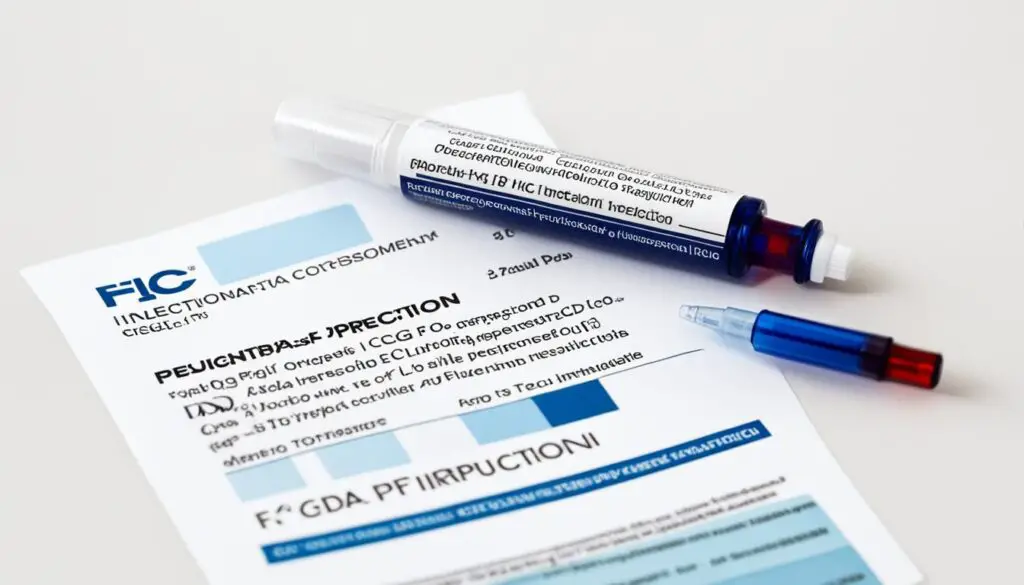
HCG diet injections are not approved by the FDA for weight loss. They are only approved as prescription drugs for the treatment of female infertility and other medical conditions. The FDA has not evaluated HCG diet injections for safety or effectiveness for weight loss. It is important to note that there is no substantial evidence to support the claim that HCG increases weight loss beyond caloric restriction. Therefore, using HCG diet injections for weight loss is not considered safe according to the FDA.
| FDA Approval | Prescription Requirements |
|---|---|
| HCG diet injections are not approved for weight loss by the FDA | They are approved as prescription drugs for the treatment of female infertility and other medical conditions |
| The FDA has not evaluated HCG diet injections for safety or effectiveness for weight loss | There is no substantial evidence to support the claim that HCG increases weight loss beyond caloric restriction |
| Using HCG diet injections for weight loss is not considered safe according to the FDA | |
Very Low-Calorie Diets and Health Risks
Living on a very low-calorie diet, such as the one recommended with HCG diet injections, is not only unhealthy but also dangerous. These restrictive diets put individuals at an increased risk for side effects, including gallstone formation, imbalanced electrolytes, and irregular heartbeat.
Very low-calorie diets should only be used under strict medical supervision, and even then, there is a risk of not obtaining enough essential nutrients. Gradual and balanced weight loss is recommended for long-term health.
| Health Risks of Very Low-Calorie Diets |
|---|
| Gallstone formation |
| Imbalanced electrolytes |
| Irregular heartbeat |
| Nutrient deficiencies |
Quote:
“Living on extreme low-calorie diets can have serious health consequences. It is important to prioritize long-term health over short-term weight loss goals.”
Very low-calorie diets can have detrimental effects on the body. They may cause muscle loss, slow down metabolism, and disrupt hormonal balance. These diets often lead to nutrient deficiencies, as they lack the necessary variety and quantity of essential nutrients to support overall health.
- Gallstone formation: Rapid weight loss and low-calorie diets increase the risk of developing gallstones. Gallstones can cause severe pain and may require medical intervention.
- Imbalanced electrolytes: Insufficient calorie intake can disrupt the balance of essential electrolytes, such as sodium, potassium, and calcium, leading to muscle cramps, weakness, and irregular heartbeats.
- Irregular heartbeat: Very low-calorie diets can disrupt the normal rhythm of the heart, resulting in arrhythmias that may be potentially life-threatening.
- Nutrient deficiencies: Severely restricted diets may not provide enough vitamins, minerals, and other essential nutrients required for optimal bodily functions. This can weaken the immune system, impair cognitive function, and increase the risk of developing chronic diseases.
It’s crucial to prioritize your health when considering weight loss methods. Consult a healthcare professional before embarking on any diet plan, especially those involving very low-calorie intake, to ensure your well-being and safety.
Homeopathic HCG Products and Mislabeling
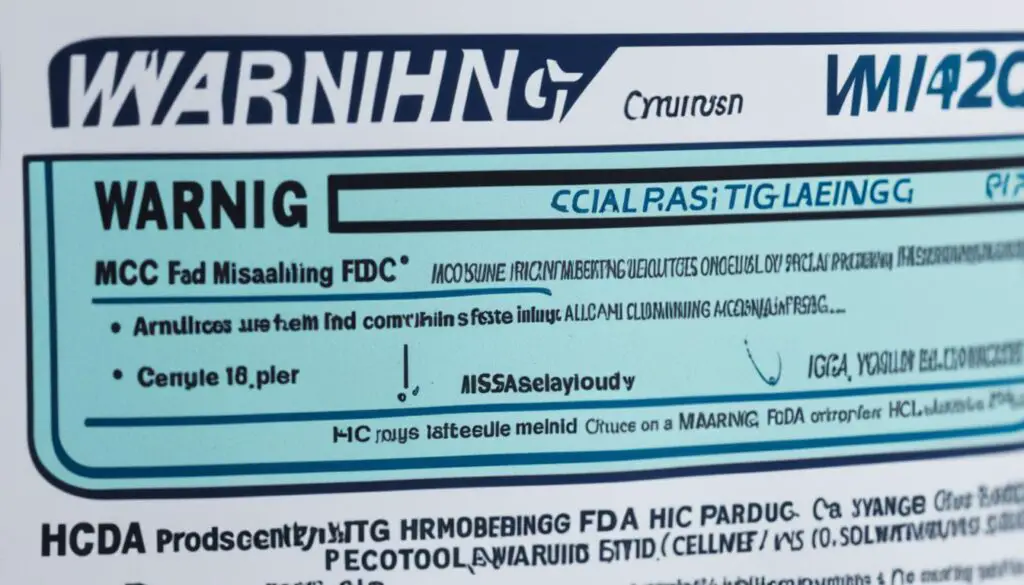
Some companies market HCG products labeled as “homeopathic” for weight loss. However, these products are still considered illegal by the FDA. The FDA and the FTC have issued warning letters to companies selling these unapproved and misbranded drugs. These homeopathic HCG products are often sold online, in retail stores, and in the form of oral drops, pellets, or sprays. It is important to be cautious of these products and to follow FDA regulations and guidelines.
Homeopathic HCG products are falsely marketed as a safe and effective method for weight loss. However, the FDA has not approved HCG diet injections for weight loss, regardless of their labeling as homeopathic. These products are not evaluated by the FDA for safety or effectiveness, and their sale violates the Federal Food, Drug, and Cosmetic Act.
Consumers should be aware of the potential risks associated with homeopathic HCG products, such as the lack of quality control and standardized doses. These products may contain unknown or harmful ingredients, putting users at risk of adverse effects. It is crucial to prioritize your health and safety by seeking FDA-approved and regulated weight loss methods.
Here are some key points regarding homeopathic HCG products and mislabeling:
- Companies market HCG products labeled as “homeopathic” for weight loss, which is illegal according to FDA regulations.
- The FDA and the FTC have issued warning letters to companies selling unapproved and misbranded homeopathic HCG products.
- These products are often sold online, in retail stores, and come in various forms like oral drops, pellets, or sprays.
- Homeopathic HCG products have not been evaluated by the FDA for safety or effectiveness.
- These products may contain unknown or harmful ingredients, posing risks to consumers.
- When considering weight loss methods, it is important to choose FDA-approved and regulated options.
Don’t fall into the trap of misleading advertising or unapproved products. Prioritize your health by following FDA guidelines and regulations. Consult with healthcare professionals for safe and effective weight loss solutions.
Reporting Adverse Events Related to HCG Diet Injections
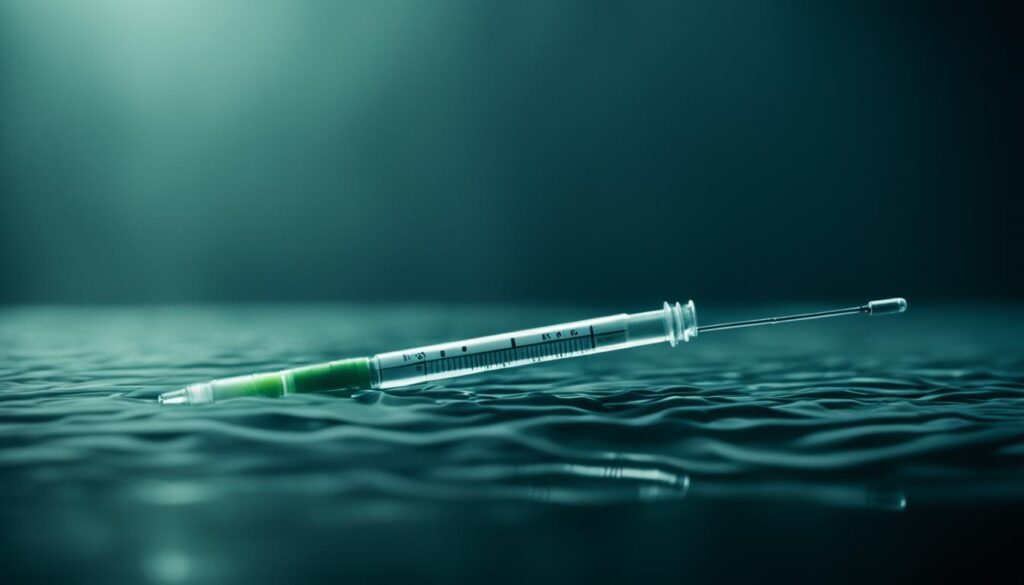
Ensuring the safety and efficacy of any medical treatment is of utmost importance. When it comes to HCG diet injections, it is crucial to report any adverse events or side effects to the appropriate authorities. By doing so, you can contribute to the monitoring and regulation of these products, ultimately helping protect the public.
Consumers and healthcare professionals are encouraged to report any safety concerns or side effects related to HCG diet injections to the FDA’s MedWatch Safety Information and Adverse Event Reporting Program. This program serves as a platform for reporting adverse events, allowing the FDA to gather essential data and take appropriate actions to ensure public safety.
Reporting adverse events related to HCG diet injections can be done online through the FDA’s MedWatch reporting system. It only takes a few minutes to provide valuable information that can make a significant difference. Alternatively, you can download and submit the appropriate reporting form. Regardless of the method chosen, the key is to report any safety concerns or side effects promptly.
By reporting adverse events, you can help the FDA monitor the safety and effectiveness of HCG diet injections. This information enables the FDA to identify potential safety risks, investigate companies that violate regulations, and make informed decisions regarding these products. Your report can truly make a difference in safeguarding public health.
Remember, your voice matters, and reporting adverse events related to HCG diet injections is an essential step towards promoting transparency, safety, and accountability in the healthcare industry.
Reporting adverse events related to HCG diet injections to the FDA’s MedWatch Safety Information and Adverse Event Reporting Program is vital for ensuring the continued safety of individuals who use these products. Your contribution is valuable in maintaining and improving the standards and regulations surrounding HCG diet injections. Together, we can work towards a safer and more informed healthcare landscape.
Conclusion
Based on the FDA’s stance on HCG diet injections, it is evident that these injections are not considered safe or effective for weight loss. The FDA has not approved HCG diet injections for this purpose and warns against their use. There is no substantial evidence to support the claim that HCG increases weight loss beyond caloric restriction. In fact, following a very low-calorie diet while using HCG diet injections can lead to various health risks and side effects such as gallstone formation, electrolyte imbalances, and irregular heartbeat.
It is essential to prioritize safety and follow FDA regulations when considering weight loss methods. Consulting with a healthcare professional is crucial for making informed decisions about safe and effective weight loss strategies. It is important to explore alternative options and adopt gradual, balanced approaches to achieve long-term weight loss and maintain overall well-being.
Remember, your health is paramount, and it is essential to prioritize evidence-based practices when seeking weight loss solutions. The FDA’s guidelines and regulations serve to protect consumers and ensure their well-being. By adhering to these guidelines, you can make informed choices and pursue safe and effective weight loss methods that align with your health and wellness goals.
FAQ
What is the FDA’s opinion on HCG diet injections safety?
The FDA advises consumers to avoid HCG weight-loss products that are marketed with a severely restrictive diet. HCG is a hormone produced during pregnancy and is not approved for weight loss. The FDA has approved HCG for the treatment of female infertility and other medical conditions, but there is no substantial evidence that it increases weight loss beyond caloric restriction.
What are the risks associated with HCG diet injections?
Following a very low-calorie diet while using HCG diet injections can lead to various risks and side effects. Some reported side effects include fatigue, irritability, restlessness, depression, fluid buildup, and swelling of the breasts in males. Additionally, there is a concern for the risk of blood clots forming and blocking blood vessels. The severe calorie restriction can also result in gallstone formation, electrolyte imbalances, and irregular heartbeat.
What are the FDA regulations on HCG diet injections?
The FDA has not approved HCG diet injections for weight loss. It is considered an unapproved drug for such use. According to the FDA, HCG weight-loss products are illegal and are in violation of the Federal Food, Drug, and Cosmetic Act. The FDA and the Federal Trade Commission (FTC) have issued warning letters to companies marketing over-the-counter HCG products labeled as homeopathic for weight loss. These products have not been evaluated by the FDA for safety or effectiveness.
How effective are HCG diet injections for weight loss?
While some people may experience weight loss while using HCG diet injections, it is likely due to the extreme calorie restriction rather than the HCG hormone itself. The FDA has stated that there is no substantial evidence to support the claim that HCG increases weight loss beyond caloric restriction. Therefore, the effectiveness of HCG diet injections for weight loss is questionable. It is important to discuss safe and effective weight loss options with a healthcare professional.
Is HCG diet injections safe according to FDA?
HCG diet injections are not approved by the FDA for weight loss. They are only approved as prescription drugs for the treatment of female infertility and other medical conditions. The FDA has not evaluated HCG diet injections for safety or effectiveness for weight loss. It is important to note that there is no substantial evidence to support the claim that HCG increases weight loss beyond caloric restriction. Therefore, using HCG diet injections for weight loss is not considered safe according to the FDA.
Are very low-calorie diets healthy?
Living on a very low-calorie diet, such as the one recommended with HCG diet injections, is not only unhealthy but also dangerous. These restrictive diets put individuals at an increased risk for side effects, including gallstone formation, imbalanced electrolytes, and irregular heartbeat. Very low-calorie diets should only be used under strict medical supervision, and even then, there is a risk of not obtaining enough essential nutrients. Gradual and balanced weight loss is recommended for long-term health.
What are homeopathic HCG products and are they safe?
Some companies market HCG products labeled as “homeopathic” for weight loss. However, these products are still considered illegal by the FDA. The FDA and the FTC have issued warning letters to companies selling these unapproved and misbranded drugs. These homeopathic HCG products are often sold online, in retail stores, and in the form of oral drops, pellets, or sprays. It is important to be cautious of these products and to follow FDA regulations and guidelines.
Consumers and healthcare professionals are encouraged to report any adverse events or side effects related to the use of HCG diet injections to the FDA’s MedWatch Safety Information and Adverse Event Reporting Program. This can be done online or by downloading and submitting the appropriate reporting form. Reporting these events helps the FDA monitor the safety and effectiveness of HCG diet injections and take appropriate actions against companies that are violating regulations.
What is the conclusion regarding the FDA’s stance on HCG diet injections safety?
The FDA’s stance on HCG diet injections is clear – they are not approved for weight loss and there is no substantial evidence to support their effectiveness. The FDA warns against the use of HCG weight-loss products due to their potentially dangerous practices and very low-calorie diets. It is important to consider the risks and follow FDA regulations when it comes to HCG diet injections. Consulting with a healthcare professional is essential for making informed decisions about safe and effective weight loss methods.

